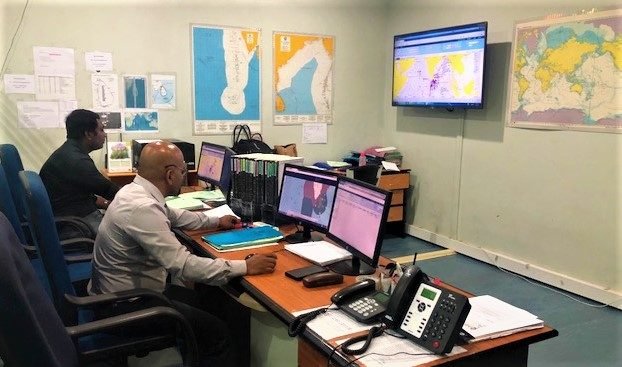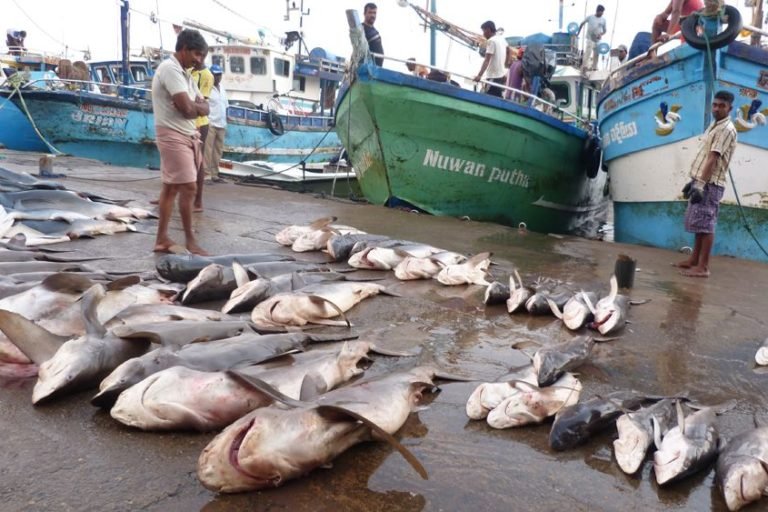COLOMBO — Mahalingam Kanapathi set off from his hometown of Beruwala in southwestern Sri Lanka in May 2021. Less than a month later, and nearly 3,000 kilometers (1,900 miles) away, the fishing boat he captained was seized by the coast guard of Seychelles.
Kanapathi was charged and tried for illegal fishing in Seychelles waters. He was convicted and ordered to pay a fine of 2.5 million Seychelles rupees, or about $174,000. Unable to do so, he was sentenced to two years in jail.
Kanapathi’s case is part of an increasingly common pattern of Sri Lankan fishermen, often from Beruwala, engaging in illegal, unreported and unregulated fishing in the waters of other countries and territories in the Indian Ocean. IUU fishing, as it’s known, is thought to account for about 20% of the world’s total fish catch, undermining efforts for sustainable fishing.
While the massive, distant-water industrial fleets like those of China and South Korea have come to epitomize IUU fishing, in Sri Lanka the practice largely the domain of traditional fishers. These fishers have from historical times engaged in what’s known as “island job,” or dupath rassawa in the Sinhala language — fishing in the shallow coastal waters off small islands. And the abundance of such islands throughout the western Indian Ocean — from the British-administered Diego Garcia to Seychelles, Mauritius and the Maldives, to the Myanmar and Bangladesh islets in the Bay of Bengal — gives the fishermen plenty of choice, says Anthony Thomas, a fisherman.
“We know that it is illegal to fish in these foreign waters without a permit, but we can easily catch more fish than by fishing in Sri Lankan waters, so we often do this as the yield is worth the risk,” says Thomas, who, like Kanapathi, is also from Beruwala, and who has also experienced being caught and jailed for illegal fishing in Seychelles. In Thomas’s case, though, he spent only a few weeks in custody. “Our boat and the gear were confiscated, but the owner of the boat paid the fine and then Seychelles repatriated us,” Thomas tells Mongabay.
Fishing in troubled waters
He says he knows other fishermen who go out every year to fish in other countries’ waters. The threat of a fine and a short stint in jail hasn’t managed to deter the practice, prompting authorities in some of these jurisdictions, including Seychelles, to start imposing stiffer penalties. The court in Seychelles that sentenced Kanapathi, for instance, said previous sentencing patterns “have not been sending the right signal back to their home state,” allowing foreign fishers to continue treating Seychelles waters as “an El Dorado for illegal fishing.”
Diego Garcia, part of the British Indian Ocean Territory, sits inside the Chagos Marine Protected Area, one of the largest marine reserves in the world. It’s a rich fisheries habitat that draws Sri Lankan vessels for illegal fishing: between 2010 and 2020, 91 of the 120 vessels seized there for illegal fishing were flying the Sri Lankan flag, according to official data from Diego Garcia. Most of them were from Beruwala, and their target was sharks.
There were more than 14,300 arrests in connection with illegal shark fishing in the area during that same period, according to a 2021 study.
“The study’s results also highlighted the grim reality that we have overfished the sharks in our waters, so the fishermen have to keep on going out to foreign waters,” said Asha de Vos, a marine biologist who co-authored the study.

Series of arrests
According to Sri Lanka’s Department of Fisheries and Aquatic Resources (DFAR), 121 multi-day fishing boats flying the country’s flag were seized in foreign waters from 2019 to 2021. Of these, 31 were seized in the Maldives, 19 in Diego Garcia, 10 in Seychelles, four in Bangladesh, and three in Myanmar. Fifty-four vessels were apprehended in Indian waters.
The latest reported case occurred last November, when authorities in Myanmar seized a Sri Lankan vessel carrying seven fishermen. One of them was a 60-year-old with multiple ailments, and another was the father of a 5-month-old baby. In most of these cases, the fishermen tend to be the sole earners in their families, and their arrest has massive repercussions back home.
“When we continue to fish, we often have closer contact with other boats, so if we found any approaching boat, we receive alerts,” Thomas says of the informal network that helps the fishermen evade arrest. “There are times when we abandon our gear and move to evade the coast guard.”
But often they see the fishing effort as worth the risk, so the tradition continues even though they know it’s illegal, Thomas says.

EU ban on fish imports
In 2014, the European Union cited IUU fishing practices as the main reason for imposing a ban on imports of fish from Sri Lanka. This had a crippling effect on the island’s seafood industry and associated livelihoods. The EU lifted the ban in 2016 after the Sri Lankan government initiated steps to curb IUU fishing, including imposing a vessel monitoring system (VMS) on multi-day boats that sail beyond Sri Lankan waters.
Sri Lanka has about 4,200 registered multi-day fishing boats, of which around 1,500 operate in international waters and all fitted with VMS equipment for easy vessel tracking. These high-seas vessels are all licensed to fish in international waters, but not in the waters of other jurisdictions — typically defined as within 200 nautical miles (370 km) of those countries’ coast.
To get around the ban on IUU fishing in Sri Lankan waters, these vessels engage in IUU fishing in international waters, says Kalyani Hewapathirana, director of fishing operations at the DFAR.
She says her office’s focus is to prevent, deter and eliminate IUU fishing, whether inside Sri Lankan waters or outside. To that end, the country in 2011 ratified the U.N. Food and Agriculture Organization’s agreement on port state measures (PSM), which went into force in 2016. Under the agreement, signatory countries must prevent vessels engaged in IUU fishing from using their ports or landing their catches.
The Sri Lankan government has also prepared and implemented a national plan of action, in line with the FAO’s international plan of action, to prevent, deter and eliminate IUU fishing, Hewapathirana tells Mongabay. Sri Lankan officials are also collaborating with their counterparts in Australia and taking steps to introduce VMS across the wider multi-day boat fleet, she says.
This means that Sri Lankan vessels in breach of international maritime law will have their license suspended. The VMS team also monitors cases of departing boats that stop transmitting signals — a practice that’s often associated with vessels attempting to engage in IUU fishing undetected.
Banner image of a Seychelles patrol vessel sailing alongside a Sri Lankan fishing boat taken into custody for illegal fishing, courtesy of the Seychelles People’s Defence Force.













